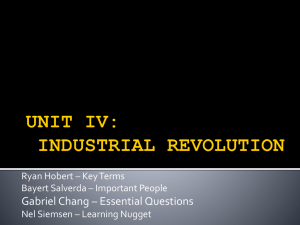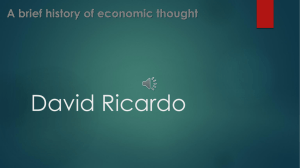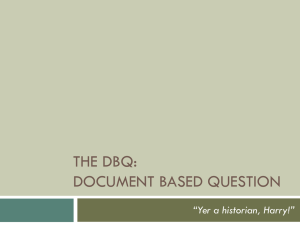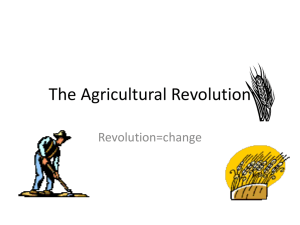File
advertisement
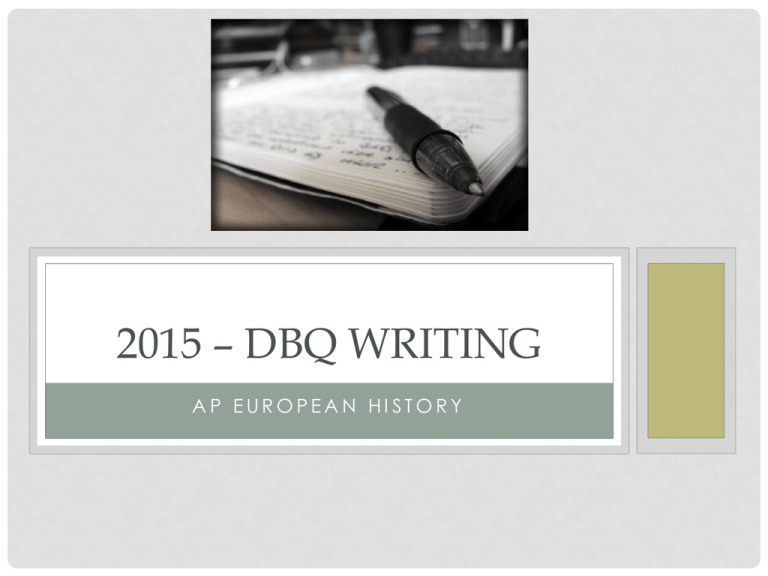
2015 – DBQ WRITING AP EUROPEAN HISTORY WHAT IS AN AP EURO DBQ? AP Euro DBQs are multi-paragraph essays that do not simply measure what you know (in formal writing fashion) but what you can do. (in formal writing fashion) Similar to an FRQ… 1. You are given a prompt w/ similar tasks & terms 2. You are going to construct a thesis which is the foundation of the essay 3. You are going to construct body paragraphs that support & develop you thesis DIFFERENT FROM AN FRQ… 1. You are actually expected to know nothing about the topic – all of the evidence is provided for you! 2. The construction of your thesis is completely dependent on your analysis of the documents, and ability to make connections with what the prompt calls for. 3. You will need to identify Point-of-View and/or the personal bias that is associated w/ the source of some of the documents. 4. You must ALWAYS have at least 3 body paragraphs 5. Outside knowledge is a bonus, where with an FRQ it is a must! IT’S JUST PUTTING THE PIECES TOGETHER STEP #1: TASKS & TERMS Prompt: Analyze various arguments that emerged over the course of the nineteenth century about how to improve the lives of European workers. Historical Background: Economic changes in the nineteenth century dramatically increased the number of European industrial workers and transformed the conditions under which they lived and worked. Tasks: Analyze Terms: arguments / 1800s / how to improve lives of workers TASKS: ANALYZE TERMS: ARGUMENTS / 1800S / HOW TO IMPROVE LIVES OF WORKERS • Brainstorm what you know about the topic •A udience → who is this written to / or for •P lace & time → a German soldier in the trenches may have different perspective compared to others •P rior knowledge → what do YOU know about it •A uthor → what characteristics does author have •R eason for writing → writer’s objective, ulterior motive •T he main idea → knowledge / interpretation •S ignificance → why did the writer of the dbq include this DOCUMENT ANALYSIS • What do you know about the author / source… • What is the main point of the document – how does it relate to the prompt (what are they arguing in regards to improving workers lives?) • What category (or categories) would you label it as in regards to the prompt DOCUMENT #1 The main idea: Thomas Malthus, English Economist, An Essay on the Principal of Population, 2nd edition, 1803 “the causes of poverty and social inequality cannot be resolved by the rich or by government intervention; the poor should have patience” Category ⟶ laissez-faire / non-government intervention DOCUMENT #2 David Ricardo, English economist, Principles of Political Economy & Taxation, 1817 • Main Idea: – legislative reforms to increase workers’ wages (like the poor laws) run counter to the principles of free-market enterprise (laissez-faire); further, Ricardo shifts responsibility to the poor and suggests ironically that the legislature regulate population size. The principal thrust of this document is that Ricardo opposes government intervention Category ⟶ laissez-faire / non-government intervention DOCUMENT #3 Saint-Amand Bazard, French social theorist, public lecture, 1828 • The Main Idea: – Laissez-faire policies are not effective in alleviating miseries of the poor in the short term. Category → Government Intervention / Socialist/ Reformist DOCUMENT #4 London Workingmen’s Association Petition to Parliament for the “Peoples Charter,” 1838 • The Main Idea: – Granting the suffrage to all workers over the age of 21 will relieve the suffering of the laboring poor. Category → suffrage (workers need the right to vote) / unity DOCUMENT #5 Flora Tristan, French writer and political activist, The Workers’ Union, 1843 The Main Idea: – only through unity will the working class be able to demand concessions from the bourgeoisie, and the unity of working men and women will result in gender equality Category → unity, women’s equality & rights / socialist / radical Karl Marx & Friedrich Engels, German social theorists, The German Ideology, 1845 - 1846 DOCUMENT #6 • The Main Idea: – A wholesale revolution is the only way to achieve the overthrow of the ruling class Category → revolutionary / radical DOCUMENT #7 Louis Blanc, French political leader, The Organization of Labor, introduction to the second edition, 1848 • The Main Idea: – only strong government intervention can successfully overturn laissez-faire principles in order to alleviate social inequality Category → government intervention / activist / socialist DOCUMENT #8 Pauline Roland, French writer and political activist, letter to the editor of the French newspaper Universal Well-Being, 1851 • The Main Idea: – Women should have a right to the same employment opportunities as men in order to establish their independence Category → Women’s equality & rights / radical / socialist – state intervention DOCUMENT #9 Ferdinand Lasalle, German political activist, “The Workers’ Program,” public speech delivered in Berlin, 1862 • The Main Idea: – only the state, ruled by the ideas of the working class, can promote and protect the moral principles of equality for all people Category → government intervention DOCUMENT #10 John Stuart Mill, English political theorist and member of Parliament, Chapters on Socialism, unfinished book, begun in 1869 & published posthumously in 1879 • The Main Idea: – contrary to the beliefs of Socialists, the current system of liberal government is slowly eradicating social injustices Category → laissez-faire / non-government intervention DOCUMENT #11 Central Electoral Committee of the Eleventh Arrondissement of the city of Paris during the period of the Paris Commune, March 1871 • The Main Idea: – the realization of the commune will ensure the establishment of individual rights for all citizens and eliminate class distinctions Category → revolution DOCUMENT #12 Alexandre Millerand, member of the French national legislature, speech, 1896 • The Main Idea: – suffrage seeks to establish economic & political liberation for all, rather than to resort to revolution Category → Suffrage (workers need the right to vote), Socialism CATEGORIES 1. Laissez-Faire / non-interventionist (1,2,10) 2. State or Government intervention / socialism (3,5,7,8,9,12) 3. Radical / Revolutionary (5,6,8,11) 4. Unity (4,5,9,11) 5. Working women’s rights (5,8) 6. Expanded suffrage / workers’ rights (4,8,12) ACTION AT GHS 2009 JUNIOR CLASS WERE WINNERS THAT YEAR Five individual responses from people who were there: 1. Junior Football Player 2. Senior Cheerleader 3. Principal 4. Over-protective mother of a Freshman girl 5. Sophomore band member 3 IMPORTANT POV POINTS TO CONSIDER 1. POV is an analysis of the SOURCE not the DOCUMENT 2. POV analysis must be explicitly REASONABLE 3. POV analysis must be explicitly RELEVANT 4 CATEGORIES OF POV 1. 2. 3. 4. Authorial (background of the author) Reliability Tone or Intent Grouping / Types of Documents & their purposes DEMONSTRATING POINT OF VIEW / BIAS (AUTHORIAL) Show your awareness that the gender, occupation, class, religion, nationality, political position, or ethnic identity of the author could influence his/her views. • Example: • “Mr. Hart, a long time cynic of the GHS marching band, was obviously critical of the band’s performance at the Rose Parade.” • “Senator Davidson, leader of the Republican Senate Committee, was naturally in disagreement of President Obama’s plan for health care reform due to the longstanding feud between Republicans and the President’s administration.” POINT OF VIEW / BIAS RELIABILITY Examine a source for its reliability and accuracy by questioning if the author of the document would be in a position to be accurate. • Example: • Mr. Hart’s book, “How to Survive & Thrive at GHS,” is probably accurate, since he has worked and observed student life and culture at Glendora High School for over 15 years. POINT OF VIEW / BIAS TONE OR INTENT Examine the text of a document to determine its tone (satire, irony, indirect commentary, etc.) or the intent of the author. Especially useful for visual documents, like art work or political cartoons. Example: Michaelangelo, through his sculpture of David, intended to glorify not simply himself or the human body, but the strength and vitality of Florence as the center of culture and economic dominance among the other competing city-states. POINT OF VIEW / BIAS GROUPING OF DOCUMENTS Show an awareness that certain types of authors, simply by their authorship, will express similar views when you group documents by type of author. • Example: • As former UCLA football players, John, Alex, and Jim all poked fun at the scandal that rocked the USC football program. POINT OF VIEW AUTHORIAL “David Ricardo stated that wages should not be controlled by government. As a classical economist and supporter of laissezfaire, Ricardo would have collected evidence to reinforce his conclusion that free markets should continue.” (Doc.2) “Marx and Engels were two of the most anti-capitalistic men of their era and it is easy to see that their main course of action would be to overthrow the imperialistic, capitalistic government of Europe.” (Doc.6) “The Workingmen’s Association, made up of members of the class most afflicted by the government’s apathy, experienced first-hand the problems caused by a lack of representation.” (Doc.4) POINT OF VIEW RELIABILITY “Bazard is speaking in a public lecture, meaning that he may have been trying to gain the worker’s favor by pointing out the cruelties of capitalism.” (Doc.3) “But the fact that Louis Blanc is a French political leader where the workers were more inclined to demand equality and betterment of living standards, indicates that he may have inevitably chosen to cater to their needs to gain their support and bring stability to France.” (Doc. 7) “Roland, a writer and political activist, expressed her ideals of gender equality. She, as a woman, is a reliable source of the reformist viewpoint that many women held on the topic of gender equality.” (Doc.8) POINT OF VIEW TONE “The urgency and passion of this document was obviously intended to appeal workers’ emotions and inspire revolution, making it propaganda.” (Doc.6) “It is no surprise that Blanc would use such strong rhetoric, being that he would be instrumental in calling for the socialist June Days Revolt that protested the liberal victory in the popular election.” (Doc.7) UNACCEPTABLE POV “Tristan would obviously feel inclined for women’s rights because she is a woman.” “Marx is a communist, therefore, he is obviously biased.” “Ricardo’s work was published in a book and can be read as reliable and informed, as he is a very educated man.” “Louis Blanc is a politician, so what he states cannot be trusted or considered reliable.” INTRODUCTORY PARAGRAPH W/ THESIS EXAMPLE • As a revolution in politics left its imprint upon European society throughout the 19th century, so to did the ever-changing revolution in industry. From the steady increase in enclosure on the country side, to the new rising demand for labor in factories, Europe began to evolve into a strong industrial and urbanized society. This historic transition, though, came with many obstacles and challenges that plagued urban laborers and their families. With these challenges lurking in the shadows of new political ideologies, there came loud and distinct arguments to remedy the plight of the new urban working class. Many socialists advocated reforms that would put government in greater control of both the economy and society, while a group of conservatives espoused a laissez –faire approach which had been more widely practiced in the early stages of industrialization. Along the way there were arguments that both greater gender equity as well as universal suffrage would improve working society. REVOLUTION / RADICAL BODY PARAGRAPH EXAMPLE Along with the notion of more government intervention, there were those who argued that it was revolution that would be needed for real and effective change. The ideas of Marx and Engels’ revolutionary communist philosophy gained traction in politically unstable France, leading to multiple uprisings in the nineteenth century. Their insistence that “revolution is necessary” inspired many to do just that in 1848. (doc. 6) Marx and Engels were two of the most anti-capitalist men of their era and it is easy to see that their main course of action would be to overthrow the imperialistic, capitalistic governments of Europe. One of those whom they inspired was Louis Blanc, French political leader, who in his Organization of Labor called out the “regime of inequality” that he felt was plaguing the modern state. (doc. 7) It is no surprise that Blanc would use such strong rhetoric, being that he would be instrumental in calling for the socialist June Days Revolt that protested the liberal victory in the popular election. The call for socialist revolutionary change reached its peak with the Paris Commune, an organization of radical, egalitarian socialists, who briefly took control of the capital in 1871. They wanted to fulfill Marx’s ideal of having “no class distinctions.” (doc. 11) The reliability of this point of view can be questioned due to the overwhelming numbers of commune members who were from the poor ranks themselves, and therefore would most likely not benefit from class distinctions in society FINALLY…THE ASSIGNMENT! Word Process your DBQ Essay 1. Highlight your thesis 2. Highlight your attempts at POV (different color) 3. Where you incorporate “outside information,” write the initials “O.I.” next to it in the margin. 4. Staple the Green Check-off sheet to the front of your essay, fill out “writer’s check-off”


